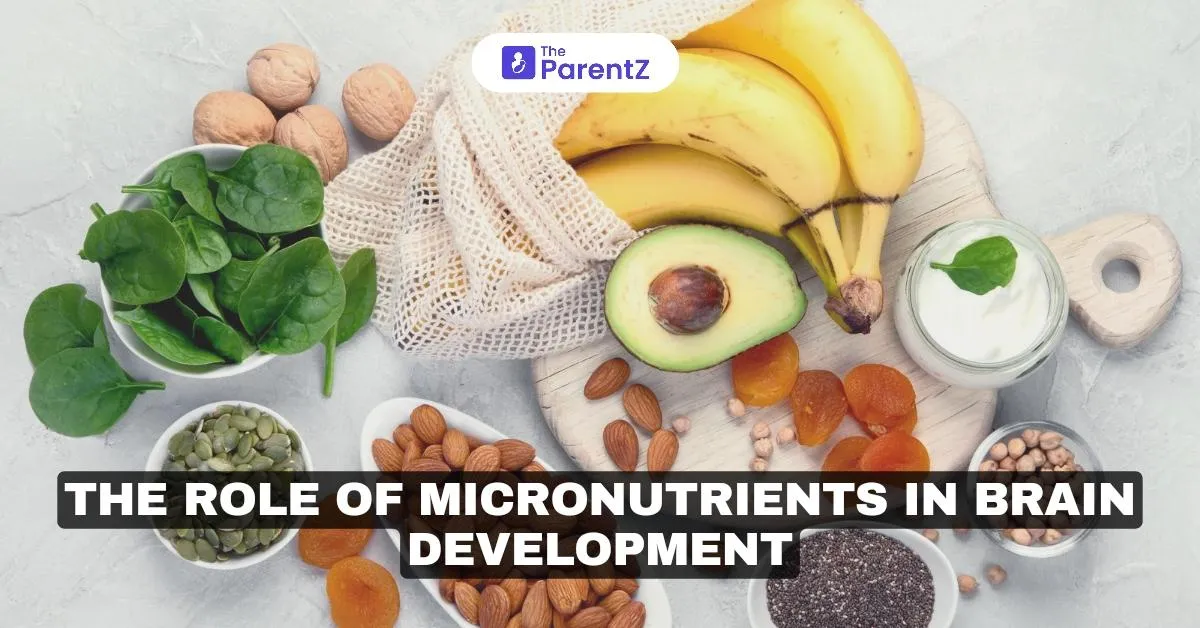Brain development is a complex process shaped by genetics, environment, and nutrition. Among these factors, nutrition particularly the availability of essential micronutrients—plays a central role in fostering cognitive function, memory, and emotional regulation. Micronutrient deficiencies, often unnoticed, can significantly hinder a child’s growth and mental capacity.
What Are Micronutrients?
Micronutrients are vitamins and minerals required in small amounts to regulate critical physiological processes in the body. Unlike macronutrients such as carbohydrates, proteins, and fats that provide energy and structural support, micronutrients are non-energy-producing substances essential for cellular function, immunity, and growth.
Examples of micronutrients include vitamins A, D, E, C, and the B-complex group, along with minerals like iron, zinc, iodine, selenium, and magnesium. Despite their minimal required intake, these nutrients have an outsized influence on health, especially during childhood development.
Micronutrients Vital for Brain Development
Brain development occurs most rapidly during pregnancy, infancy, and early childhood. During these stages, several micronutrients are indispensable for optimal cognitive and emotional growth:
1. Iron: Iron plays a vital role in oxygen delivery to brain cells and energy metabolism. Deficiency can impair attention span, memory, and motor development.
2. Zinc: Zinc is essential for neurogenesis (creation of neurons) and synaptic plasticity, which influences learning and memory.
3. Iodine: Iodine supports thyroid hormone production, crucial for brain growth, nerve cell differentiation, and overall intellectual development.
4. Folate (Vitamin B9): Folate aids in DNA synthesis and neural tube formation during early fetal development, preventing structural brain defects.
5. Vitamin B12: Vitamin B12 supports the formation of the myelin sheath, which protects nerve fibers and ensures efficient signal transmission.
6. Vitamin D: Vitamin D regulates genes involved in brain function and protects against cognitive disorders.
7. Omega-3 Fatty Acids: While not strictly a micronutrient, omega-3s such as DHA complement their role by contributing to neuronal structure and synaptic communication.
Common Deficiencies and Incidence
Micronutrient deficiencies are a global concern, particularly in developing countries where diets may lack diversity. Key deficiencies affecting brain development include:
• Iron Deficiency: Over 30% of children worldwide suffer from anemia, which negatively impacts cognitive performance.
• Iodine Deficiency: The most common cause of preventable intellectual disabilities, affecting children in iodine-deficient regions.
• Zinc Deficiency: Prevalent in low-income populations, leading to growth delays and impaired brain function.
• Vitamin B12 Deficiency: Found in vegetarian diets or among those with absorption issues, resulting in nerve damage and developmental delays.
• Vitamin D Deficiency: Increasingly recognized globally due to insufficient sunlight exposure and limited dietary sources.
Consequences of Micronutrient Deficiency
Micronutrient deficiencies can lead to a range of neurological and developmental challenges:
1. Cognitive Delays: Iron and iodine deficiencies reduce IQ levels, impairing problem-solving, memory, and learning abilities.
2. Delayed Neural Development: Insufficient folate during pregnancy raises the risk of neural tube defects such as spina bifida.
3. Behavioral Problems: Zinc deficiency can lead to hyperactivity, inattentiveness, and poor emotional regulation.
4. Neurological Disorders: Long-term vitamin B12 deficiency may result in irreversible nerve damage and motor skill deficits.
5. Mental Health Issues: Vitamin D deficiency has been linked to depression and poor cognitive resilience.
How to Address Micronutrient Deficiency
Parents play a critical role in preventing and addressing micronutrient deficiencies. Below are some practical steps:
1. Encourage a Balanced Diet
Ensure meals include a wide range of nutrient-dense foods such as fruits, vegetables, whole grains, legumes, dairy products, and lean proteins. Foods like spinach, eggs, fish, nuts, and beans are excellent choices for boosting micronutrient intake.
2. Choose Fortified Foods
Fortified products such as iodized salt, fortified milk, and cereals can supplement the diet with critical vitamins and minerals like iodine, folate, and iron.
3. Support Prenatal Nutrition
Expectant mothers should focus on a nutrient-rich diet and take prescribed supplements, including folic acid, iron, and iodine, to ensure proper fetal brain development.
4. Breastfeeding
For infants, breastfeeding provides essential micronutrients like iron and zinc that are crucial for early cognitive and physical growth.
5. Supplementation
In cases where dietary intake is inadequate, pediatricians may recommend supplements to address specific deficiencies, such as iron drops or multivitamins tailored to the child’s needs.
6. Promote Sunlight Exposure
Encourage children to spend time outdoors for natural vitamin D synthesis while consuming foods like fatty fish and fortified milk to meet additional vitamin D needs.
7. Regular Health Monitoring
Routine pediatric check-ups can help identify growth patterns, developmental milestones, and signs of deficiencies early on, allowing for timely interventions.
Sources of Key Micronutrients
• Iron: Found in red meat, poultry, spinach, lentils, and fortified cereals.
• Zinc: Available in nuts, seeds, whole grains, dairy products, and eggs.
• Iodine: Derived from iodized salt, seafood, and eggs.
• Folate: Present in leafy greens, citrus fruits, beans, and fortified cereals.
• Vitamin B12: Abundant in meat, fish, dairy, and fortified plant-based alternatives.
• Vitamin D: Sourced from sunlight, fatty fish, and fortified products.
A Keynote to Parents
Dear parents, your child’s brain development is the foundation for their lifelong potential. Micronutrients, though required in small amounts, have an immense impact on their cognitive growth and overall health. A balanced, nutrient-rich diet and regular health check-ups are your strongest tools to prevent deficiencies and ensure your child thrives. Remember, small efforts today can yield extraordinary results tomorrow.
Conclusion
Micronutrients are indispensable for brain development, influencing cognitive abilities, memory, and emotional well-being. With awareness, dietary mindfulness, and timely interventions, parents can create a solid foundation for their child’s mental and emotional growth. Proper nutrition is not just an investment in health—it’s a promise for a brighter future.








Be the first one to comment on this story.